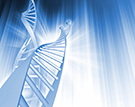
We've talked about personalized medicine and its promising approach. Today, several factors are driving medicine in this direction quicker than we imagined. Personalized medicine, also called precision medicine, treats patients based on that person's genome, environment, and lifestyle; in the case of cancer, the genome of their tumor as well. That's far more effective than traditional medicine, which is one treatment fits all.
Today, the driver of precision medicine is the increasingly detailed understanding of the human genome which will further improve as more Americans share their genetic data. When you combine that data with details about their lifestyle and health record, physicians will have a database to pair the right drugs or therapies with each patient. Researchers can use that database to help develop new treatments.
Another driver of precision medicine is the growth of electronic medical records. Access to the data has made an incredible impact on disease identification. For example, we thought cystic fibrosis was one disease. Turns out it's caused by more than one thousand different mutations that can be grouped into eight diseases. Drugs that work on one don't work on another.
But we couldn't translate these biomedical discoveries into treatments without sophisticated software. Recently President Obama launched a precision medicine initiative to collect three billion pieces of information which fortunately new software is able to analyze. One day we'll look back and realize how antiquated medicine was and be thankful we don't have to settle for average.